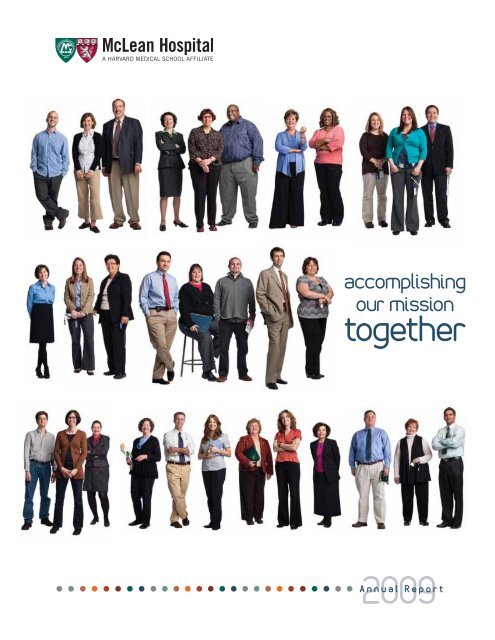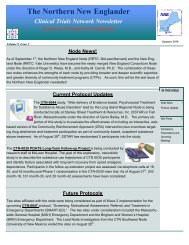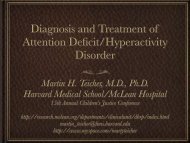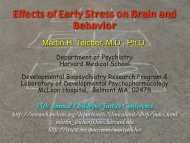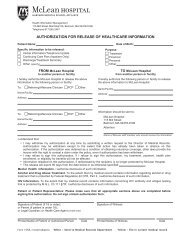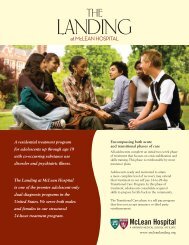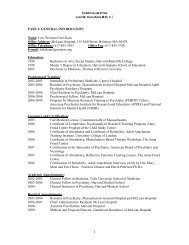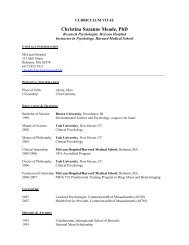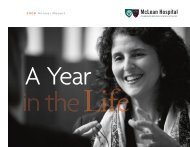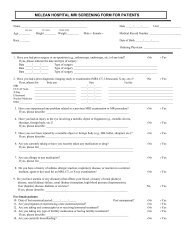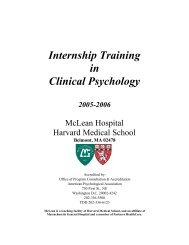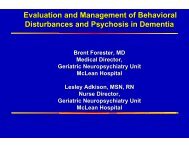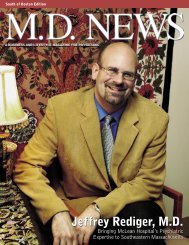Download Annual Report 2009 - McLean Hospital
Download Annual Report 2009 - McLean Hospital
Download Annual Report 2009 - McLean Hospital
Create successful ePaper yourself
Turn your PDF publications into a flip-book with our unique Google optimized e-Paper software.
accomplishing<br />
our mission<br />
together<br />
<strong>2009</strong><br />
..........................<strong>Annual</strong> <strong>Report</strong>
our<br />
mission<br />
.......................<br />
<strong>McLean</strong> <strong>Hospital</strong> is committed to providing<br />
a full range of high quality, cost-effective,<br />
mental health services to our patients,<br />
their families and the larger community.<br />
The hospital is dedicated to training mental<br />
health professionals, to conducting basic<br />
and clinical research to understand the<br />
causes of mental illnesses and to developing<br />
effective new means for their prevention<br />
and treatment.
4 Letter from Scott L. Rauch, MD,<br />
and David S. Barlow<br />
7 Mission Possible<br />
8 Integrate<br />
16 Care<br />
24 Discover<br />
32 Teach<br />
37 Financials<br />
38 Leadership<br />
41 National Council and<br />
Vision of Excellence<br />
43 Support<br />
44 Dedicate<br />
contents
Dear friends,<br />
At <strong>McLean</strong> <strong>Hospital</strong>,<br />
every day<br />
we are accomplishing our mission to improve the lives of people with<br />
psychiatric illness. We are deeply committed to providing increased<br />
access to ever-better psychiatric care, engaging in research designed<br />
to discover superior modes of treatment or prevention and offering<br />
programs to train health-care providers and educate the public. We<br />
recognize that this journey never ends, as we perpetually aspire to find<br />
better ways to deliver on this precious mission.<br />
In <strong>2009</strong>, we made significant progress in implementing our strategic<br />
plan. A challenging global economy has constrained resources and<br />
reimbursements, thereby precipitating the contraction of much-needed<br />
psychiatric services across the nation. Against this backdrop, <strong>McLean</strong><br />
has maintained a solid financial performance, enabling us to successfully<br />
expand, extend and elevate our services. For instance, extensive<br />
renovations to our Clinical Evaluation Center and Short Term Unit,<br />
coupled with new admissions processes and the installation of electronic<br />
medical record-keeping technology, have led to faster, more effective<br />
evaluation of patients. These innovations are helping to increase access,<br />
reduce waiting time and enhance comfort for patients and families.<br />
In addition, we have increased the number of beds to expand our<br />
capacity on existing units and opened novel programs to explore new<br />
frontiers. For instance, we have extended our outreach to students in<br />
need of mental health services through our pioneering College Mental<br />
Health Program. We also have established two residential facilities<br />
beyond the Belmont campus to provide an improved continuum of care.<br />
These programs, the Gunderson Residence for women with borderline<br />
personality disorder and the <strong>McLean</strong> Residence at the Brook for people<br />
4 <strong>McLean</strong> <strong>Hospital</strong> <strong>2009</strong> <strong>Annual</strong> <strong>Report</strong>
u<br />
From left: Scott L. Rauch, MD, and David S. Barlow.<br />
Message from the President and Chairman 5
with substance use disorders, are providing a structured transition<br />
into the community and on to a healthier life.<br />
With a clear vision, we are focused on integrating compassionate,<br />
evidence-based care with cutting-edge research and training by<br />
establishing a new divisional structure to support specialized centers<br />
of excellence and innovation. In the pages that follow, we describe<br />
launching the Division of Psychotic Disorders and the Division of<br />
Alcohol and Drug Abuse, highlighting new initiatives and advances<br />
reflecting enhanced coordination, collaboration and synergy.<br />
This report, in addition to providing information on a range of<br />
endeavors, offers a glimpse at the many remarkable people who make<br />
<strong>McLean</strong> such a special place—from our patients and families whose<br />
lives have been affected by mental illness, to our donors and our<br />
extraordinary crew of clinicians, scientists and staff who have<br />
dedicated their lives to this mission.<br />
We could not have made such exceptional progress in <strong>2009</strong>, nor set<br />
our sights so high for the future, without the help and inspiration of<br />
so many—including the <strong>2009</strong> <strong>McLean</strong> Award honoree, astronaut<br />
Buzz Aldrin. As always, we are grateful to our energetic board of<br />
trustees for their devotion and expertise. We also thank you—our<br />
friends and patrons—for your unwavering support. As we look to<br />
the horizon on this journey of excellence and innovation in psychiatry<br />
and mental health, we hope you will travel along with us.<br />
Scott L. Rauch, MD<br />
President and Psychiatrist in Chief<br />
David S. Barlow<br />
Chairman of the Board<br />
6 <strong>McLean</strong> <strong>Hospital</strong> <strong>2009</strong> <strong>Annual</strong> <strong>Report</strong>
Mission possi ble<br />
Buzz Aldrin shares his<br />
‘magnificent desolation’<br />
Astronaut Buzz Aldrin may have made it to the moon,<br />
but his journey upon returning to Earth was, by his own<br />
account, an even greater challenge. When he returned<br />
from the Apollo mission in 1969, Aldrin, the second<br />
person to walk on the moon, struggled with both the<br />
exhilaration and overwhelming public notoriety of<br />
having reached the grandest goal of his career at age<br />
39. He plunged into depression and substance abuse<br />
that lasted more than 10 years.<br />
On July 14, <strong>2009</strong>, Aldrin—astronaut and mental health<br />
advocate—became the second recipient of the prestigious<br />
<strong>McLean</strong> Award, which honors individuals who further<br />
the public’s understanding of psychiatric illness. The<br />
<strong>McLean</strong> Award was first bestowed upon ABC journalists<br />
Lee Woodruff and her husband, Bob Woodruff, in 2008.<br />
More than 300 guests, including <strong>McLean</strong> donors,<br />
National Council members, faculty, staff and trustees, as<br />
well as former Massachusetts Governor and First Lady<br />
Michael and Kitty Dukakis, gathered at <strong>McLean</strong>’s annual<br />
dinner in Boston to hear Aldrin’s inspirational words as<br />
he accepted the award. In his speech, Aldrin recounted<br />
personal stories about his family’s history with substance<br />
abuse, his mother’s suicide a year before his moon walk<br />
and the powerful and difficult experience of returning to<br />
Earth as an American hero. “I should have been on top of<br />
the world, but there were no roadmaps and few signposts,<br />
if any, along the way that could lead me out of the<br />
quagmire into which I had tumbled,” Aldrin said.<br />
Aldrin also signed copies of his <strong>2009</strong> New York Times<br />
best-selling memoir “Magnificent Desolation: The Long<br />
Journey Home from the Moon,” which openly reveals his<br />
struggles with psychiatric illness. In the book, Aldrin<br />
writes, “From the pinnacle of Apollo, my greatest<br />
challenge became the human one—overcoming<br />
alcoholism and living beyond depression—a challenge<br />
that required more courage and determination than<br />
going to the moon.”<br />
<strong>McLean</strong> President and Psychiatrist in Chief<br />
Scott L. Rauch, MD, introduced Aldrin. “By speaking<br />
publicly about his experiences, Buzz Aldrin has given a<br />
face to mental illness and helped to raise awareness and<br />
reduce stigma,” he said. Rauch likened the nation’s and<br />
Aldrin’s vision for space exploration 40 years ago with<br />
an equally bold vision for mental health today—one<br />
that includes broad access to services and research into<br />
prevention and improved treatment, as well as freedom<br />
from stigma and disease.<br />
“Just as space travel in the 1960s required dedicated men<br />
and women to accomplish a seemingly unattainable<br />
goal, so too does realizing this dream for mental health,”<br />
Rauch said. “It will take the commitment, teamwork,<br />
resources, resolve and leadership of<br />
those at <strong>McLean</strong> <strong>Hospital</strong> and<br />
beyond to help these goals<br />
become reality.” ■<br />
t Buzz Aldrin<br />
Mission Possible 7
integrate<br />
.........................
<strong>McLean</strong>’s foremost advances will<br />
come through the integration of<br />
its tripartite mission of clinical<br />
care, research and education,<br />
enabling us to provide care<br />
at the highest standard. As a<br />
team, we will lead the field of<br />
psychiatry through excellence<br />
and innovation.
Making connections<br />
Divisions advance<br />
<strong>McLean</strong>’s strategic agenda<br />
When Bill and Barbara Boger learned of plans for a<br />
Division of Psychotic Disorders at <strong>McLean</strong>, they saw an<br />
opportunity to make a lasting difference through their<br />
philanthropy. The Bogers, <strong>McLean</strong> National Council<br />
members and longtime donors, have contributed to<br />
many clinical and research endeavors at the hospital<br />
over the years, often helping new initiatives get their<br />
start. In <strong>2009</strong>, they saw the chance to lend both early<br />
and enduring support by establishing the Boger Bipolar<br />
Disorder Endowed Fund to help <strong>McLean</strong> launch the<br />
new division.<br />
Under <strong>McLean</strong>’s leadership model that evolved from<br />
its strategic plan, the hospital created the Division of<br />
Psychotic Disorders, led by Dost Öngür, MD, PhD,<br />
and the Division of Alcohol and Drug Abuse, led by<br />
Roger Weiss, MD, in <strong>2009</strong>. These divisions and<br />
others to come are aimed at focusing the hospital’s<br />
clinicians, researchers and educators around specific<br />
illness areas, encouraging collaborations within and<br />
across disciplines and increasing evidence-based<br />
treatment practices. Since their inception, the psychotic<br />
disorders and addictions divisions each have enjoyed a<br />
steady stream of integrative activities.<br />
Öngür, recipient of Harvard Medical School’s <strong>2009</strong>-2010<br />
Young Mentor Award, is harnessing efforts around three<br />
areas: raising awareness of and monitoring metabolic<br />
syndrome, a serious medical condition associated with<br />
antipsychotic medications; quantifying practice patterns,<br />
principally around patient medication use, to glean<br />
information for quality improvement initiatives; and<br />
developing a database of <strong>McLean</strong> patients who are<br />
interested in and appropriate for clinical studies designed<br />
to further research in psychotic disorders.<br />
10 <strong>McLean</strong> <strong>Hospital</strong> <strong>2009</strong> <strong>Annual</strong> <strong>Report</strong>
The key to advancing psychiatry<br />
and education with an emphasis o<br />
supported treatments to patients<br />
‘‘help us provide these ever-better,<br />
In the Division of Alcohol and Drug Abuse, new<br />
educational offerings are bringing together clinicians and<br />
researchers to share information and insights. “In the<br />
past, many of us have worked in relative isolation, not<br />
knowing much about the activity taking place outside<br />
our building, even among members of the <strong>McLean</strong><br />
community who share our interests and may be able to<br />
participate in mutually beneficial collaborations,” says<br />
Weiss, who has served as clinical director for the<br />
Alcohol and Drug Abuse Treatment Program for more<br />
than 20 years. “The new divisional model is helping us<br />
form connections that never before existed.” However,<br />
he adds, the model’s greatest beneficiaries are patients.<br />
“Patients within the various treatment programs can be<br />
assured they are receiving a single standard of highquality,<br />
seamless care based on the latest research.” ■
in the 21st century is integrating clinical care, research<br />
n translation—bringing innovative, scientifically<br />
uickly and effectively. Our divisional<br />
’’<br />
structures will<br />
evidence-based approaches to care.<br />
Scott L. Rauch, MD<br />
President and<br />
Psychiatrist in Chief<br />
s Members of the Division of Alcohol and Drug Abuse and Division<br />
of Psychotic Disorders include, from left: Nathalie Goletiani, MD,<br />
Valerie Robbins, MS, Nayla Hamdi, MA, Margaret Griffin, PhD,<br />
Myles Costello, William Lopez, Nancy Huxley, PhD, Grace Masters, Franca<br />
Centorrino, MD, Dost Öngür, MD, PhD, Karen Slifka, RN, MS, Christopher<br />
Will, Roger Weiss, MD, Patricia Diaferio, LICSW, Matthew Bernstein, MD,<br />
Sharon Berman, LICSW, and Eve Lewandowski, PhD.<br />
Integrate 12
Through the<br />
donors’ eyes<br />
We are very thankful for the interventions<br />
available to those who suffer from psychiatric<br />
disorders. However, it has become clear to<br />
us, as it has to clinicians, patients and parents,<br />
that major advances are still needed. We<br />
want to do whatever we can to help further<br />
the possibilities.<br />
We do not know the direction these advances<br />
will take. By creating an endowed fund under<br />
Dr. Öngür’s direction, we are giving the director<br />
of the psychotic disorders division the flexibility<br />
to use our gift for clinical care and research as<br />
he sees fit. Our endowed fund allows us to offer<br />
a long-term, sustainable gift to <strong>McLean</strong>. We hope<br />
it will make a difference for years to come.<br />
Bill and Barbara Boger<br />
National Council members<br />
Integrate 13
Linking lives,<br />
improving care<br />
Online tools provide added<br />
efficiencies, enhanced quality<br />
With the introduction of new technology, <strong>McLean</strong> is<br />
advancing communication, increasing efficiency and<br />
uniting clinical, research and academic staff and faculty<br />
in their collective quest to improve the lives of patients<br />
and their families.<br />
In September <strong>2009</strong>, the hospital greatly advanced its<br />
electronic medical record-keeping capability with the<br />
implementation of a computerized physician order<br />
entry (CPOE) system and an electronic medication<br />
administration record (eMAR) on its inpatient units<br />
and Electroconvulsive Therapy Service. The CPOE<br />
system, enabling physicians to electronically enter<br />
medication prescriptions and other physician orders, and<br />
eMAR, an online “file” for tracking the administration<br />
of medications, are reducing the chances for medication<br />
errors associated with manually processing orders and<br />
administration records.<br />
“The hospital generates thousands of medication orders<br />
each year so these tools greatly enhance the quality of the<br />
medication management process for our patients,” says<br />
Michele Gougeon, MSS, MSc, executive vice president<br />
and chief operating officer for <strong>McLean</strong>.<br />
In <strong>2009</strong>, the hospital also launched another time-saving<br />
resource. HealthStream, an Internet-based learning<br />
management system, offers employees the convenience of<br />
completing annual training online, rather than attending<br />
sessions in person. With the click of a mouse, employees<br />
can brush up on patient privacy, infection control, fire and<br />
t Among those making technological advances possible,<br />
from left, are Alisa Busch, MD, MS, Jennifer Gundy,<br />
Mark Fansel, Nancy Hoines, MPH, Andrew Laband, MBA,<br />
Linda Flaherty, RN/PC, Michele Gougeon, MSS, MSc,<br />
Jean Mansfield, Stanley Rosen, RPh, MHA, and John Robards.<br />
14 <strong>McLean</strong> <strong>Hospital</strong> <strong>2009</strong> <strong>Annual</strong> <strong>Report</strong>
laboratory safety, as well as other important information<br />
they need to do their jobs, while assuring the accurate and<br />
efficient employee compliance documentation <strong>McLean</strong><br />
needs for regulatory and accrediting agencies, such as<br />
The Joint Commission.<br />
Another technological advancement, an integrated<br />
<strong>McLean</strong> intranet site, launched in June 2010. Designed<br />
to better connect the <strong>McLean</strong> community by fostering<br />
additional communication and collaboration, the new<br />
site, with more than 500 pages of information, is a “onestop<br />
shop for employees to access internal and external<br />
resources important to the <strong>McLean</strong> community,” says<br />
Nancy Hoines, MPH, director of Business Development<br />
and Marketing. “It’s an exciting project bridging all<br />
hospital departments and campuses.”<br />
These infrastructure enhancements are being spearheaded<br />
by Andrew Laband, MBA, <strong>McLean</strong>’s chief information<br />
officer, who brings extensive management and technical<br />
experience to this newly created position. “My goal is to<br />
bring <strong>McLean</strong> to the next level, where information<br />
technology is a strategic asset used to improve patient<br />
care, research, training and operations,” he says. ■<br />
Integrate 15
care<br />
............
<strong>McLean</strong>’s fundamental purpose is to improve<br />
the lives of individuals with psychiatric<br />
illnesses and their families. As the nation’s<br />
top freestanding psychiatric hospital, we<br />
offer specialized expertise and high–quality<br />
services to a diverse population, including<br />
the most seriously ill patients.
A step up<br />
Updated facilities, streamlined<br />
admissions enhance patient<br />
and family experience<br />
In general hospitals across the country, the emergency<br />
room (ER) can be a frightening place for families with<br />
loved ones in psychiatric crisis. Patients are often<br />
distraught and family members distressed. Long waits<br />
for psychiatric beds in Massachusetts and beyond can<br />
compound this anxiety and fear.<br />
Thanks to the renovation and expansion of <strong>McLean</strong>’s<br />
Clinical Evaluation Center (CEC) and Short Term Unit<br />
(STU), patients are being evaluated and admitted to the<br />
hospital more quickly and efficiently and with more<br />
resources than ever before. In <strong>2009</strong>, the CEC, where<br />
patients are assessed upon arriving at <strong>McLean</strong>, was<br />
relocated to larger, more modern quarters in the<br />
Admissions Building. The new space “is very<br />
comfortable and attractive,” says Beth Murphy, MD,<br />
PhD, medical director of the CEC. “Families can sit<br />
together and talk, watch TV or have a bite to eat. It is<br />
much more of a place you would want to wait during a<br />
psychiatric crisis.”<br />
Patient evaluations and physical examinations now take<br />
place in rooms spacious enough for family members to be<br />
involved. Quiet waiting areas help patients stay calm.<br />
New computers and larger work stations make it easier<br />
for staff to do their jobs.<br />
In conjunction with these physical improvements, new<br />
admissions protocols are reducing the time patients in<br />
the community must wait for beds at <strong>McLean</strong>. As part<br />
of a <strong>2009</strong> pilot program, patients with low-risk or no<br />
underlying medical issues may proceed directly to<br />
<strong>McLean</strong> without requiring an ER medical clearance.<br />
This new protocol has been made possible with the<br />
help of Partners affiliate Newton-Wellesley <strong>Hospital</strong><br />
(NWH), whose ER assists the CEC with medical issues<br />
of incoming patients. If a patient arrives at <strong>McLean</strong><br />
needing immediate medical care, NWH will help<br />
transfer that patient to its ER.<br />
“These protocols have enabled us to serve more people<br />
in need and, when combined with the new physical<br />
18 <strong>McLean</strong> <strong>Hospital</strong> <strong>2009</strong> <strong>Annual</strong> <strong>Report</strong>
surroundings, have resulted in a more user-friendly<br />
admissions process,” says CEC Program Director<br />
Diane Bedell, LICSW. To compensate for the increased<br />
access, the CEC, intake and inpatient staffs at <strong>McLean</strong><br />
have worked with much dedication to provide the same<br />
high level of care, while managing patients who are<br />
coping with more challenging psychiatric illnesses.<br />
“Our teams have been very responsive,” says Bedell.<br />
“They have worked incredibly hard to accommodate<br />
our patients and their family members.”<br />
Short Term Unit expands<br />
The Short Term Unit (STU) is just one of the<br />
inpatient programs at <strong>McLean</strong> that has stepped up to<br />
accommodate the needs of patients, while undergoing<br />
its own transformation. Whereas the STU and CEC<br />
had long shared space in the Admissions Building, the<br />
STU expanded from 23 to 28 beds in <strong>2009</strong>, assuming<br />
occupancy of the entire first floor of Admissions.<br />
“The STU cares for a large number of patients,” says<br />
STU Medical Director Steven Gelda, MD. “The five<br />
additional beds have helped tremendously in our<br />
ability to treat even more patients. There has always<br />
been a need for increased access; now, we have the<br />
added capacity.”<br />
The STU features four newly constructed interview<br />
rooms, a larger nursing station, additional meeting space<br />
for group and expressive therapies, and bright, naturally<br />
lit lounge areas.<br />
The improvements made to the STU and CEC have<br />
greatly enhanced the patient and family experience at<br />
<strong>McLean</strong>, while meeting the overall need for increased<br />
access by the greater mental health community. “Our<br />
patients are receiving not only the best possible care<br />
but in an environment that’s safe and comfortable.<br />
That’s an added reassurance,” Bedell notes. ■<br />
u<br />
Staff from the Clinical Evaluation Center and Short Term Unit include, from left: Grantley Taylor, MD,<br />
Janet Lawrence, MD, Lorey Bonante, Tito Banda, Gail Levy, RN/PC, Eileen LeDuc, Reggie Silver, Pamela Thompson,<br />
LICSW, Steven Gelda, MD, Jeanne McElhinney, RN, Thomas Silva, Courtney Finn, RN, Jill Pokornicki, RN,<br />
Michael Leslie, MD, Marilyn Russo, Sandra Thompson, RN, Nicolas Simms and Angela Ficken, LICSW.<br />
Care 19
Recovery in<br />
residence<br />
New program fills gap in<br />
addiction treatment in the region<br />
In keeping with its strategic goal of extending services,<br />
the hospital has opened the <strong>McLean</strong> Residence at the<br />
Brook, a transitional living program for adults with<br />
substance use disorders. The eight-bedroom residence,<br />
located in a newly<br />
renovated Colonial in<br />
Waltham, Mass., offers a<br />
structured, supportive<br />
homelike environment. With a minimum length of stay<br />
of 90 days, the private-pay program is designed especially<br />
for individuals who have had persistent treatment<br />
relapses, need more psychosocial support than what is<br />
typically offered in other sober-living situations or have<br />
a co-occurring psychiatric illness (dual diagnosis).<br />
“The Brook completes <strong>McLean</strong>’s continuum of care and<br />
fills an area of substance abuse treatment not currently<br />
available in the region,” says Roger Weiss, MD, chief of<br />
<strong>McLean</strong>’s Division of Alcohol and Drug Abuse.<br />
“Because we’re a small program, we are able to tailor<br />
treatment to each individual’s recovery needs,” says<br />
Susan Rees, RN, MA, program director. “Our residents<br />
arrive with their own issues, triggers and stresses. Our<br />
staff, backed by the many resources at <strong>McLean</strong>, has the<br />
knowledge and expertise in substance use disorders and<br />
dual diagnosis to support people in whatever ways best<br />
empower them, at any point in their recovery.”<br />
The program’s framework focuses on “the four Rs”<br />
of treatment: regulation, recognition, relationships<br />
and responsibility, explains medical director<br />
Timothy Benson, MD. Residents learn to regulate their<br />
schedules and their emotions, recognize the factors<br />
that trigger their addictive behaviors, foster healthy<br />
interactions with others and take responsibility for<br />
their recovery. “Our model offers flexibility and is<br />
designed to work around each person’s ability and<br />
desire to transition back to life,” says Benson. ■<br />
With a counseling staff-to-patient ratio of one to four,<br />
the Brook provides highly specialized treatment that<br />
includes individual and group therapy, family meetings<br />
and psychoeducational and skills training. In addition to<br />
treating dual diagnoses, the program also departs from<br />
other recovery models by accepting those who are taking<br />
medications as part of their ongoing substance abuse<br />
treatment. Its expanded milieu allows patients to<br />
participate in several group meetings a day, four self-help<br />
groups a week, activity-based rehabilitation, including<br />
exercise and cooking, educational offerings, volunteer<br />
positions or jobs, weekly appointments with psychiatrists<br />
and twice-weekly meetings with case managers.<br />
u<br />
Debra Friedman<br />
20 <strong>McLean</strong> <strong>Hospital</strong> <strong>2009</strong> <strong>Annual</strong> <strong>Report</strong>
Building bridges to<br />
campuses<br />
Partnership with local colleges<br />
offers resources, support<br />
For college students diagnosed with psychiatric illness,<br />
campus life can be overwhelming. Newly diagnosed<br />
students are often confused about how to manage their<br />
illnesses while at school; those who have been hospitalized<br />
worry about keeping up with their studies and negotiating<br />
their social lives.<br />
According to Stephanie Pinder-Amaker, PhD, director<br />
of <strong>McLean</strong>’s College Mental Health Program (CMHP),<br />
the number of students living on college campuses with<br />
serious mental health issues is increasing at a time when<br />
resources are diminishing. “The question of how to help<br />
these students—many of whom are at great risk—<br />
weighs heavily on the minds of educators, mental health<br />
professionals and parents,” she says.<br />
The CMHP, launched with support from an anonymous<br />
donor, is aimed at partnering with Massachusetts-area<br />
colleges and universities to provide more comprehensive<br />
college mental health services. Its goals are twofold: to<br />
help students with serious mental health and adjustment<br />
issues live more productive lives and to increase their<br />
academic success by providing expert, coordinated mental<br />
health care.<br />
Pinder-Amaker, a clinical psychologist and former<br />
University of Michigan associate dean of students, and<br />
her staff are working with campus counseling centers to<br />
improve their response to psychiatric emergencies and<br />
to provide resources for students who return to school<br />
following hospitalization. In <strong>2009</strong>, <strong>McLean</strong> began inviting<br />
On the path to sobriety<br />
A young woman finds renewed hope at the Brook<br />
When Debra Friedman was a junior in high school, her mother found her passed out on a park bench, unconscious from alcohol<br />
poisoning. Just a few years later, she almost died from a heroin overdose. Debra recalls these traumatic moments as punctuation<br />
marks in her long history of alcohol and drug abuse. “I started drinking when I was 13. In high school, I faked migraines so that I<br />
could get prescription pain killers. I smoked pot. I stole my sister’s Adderall. I spent my parents’ money on cocaine.”<br />
Although Debra had tried many residential and rehabilitative school programs throughout her adolescence, it was not until she<br />
landed at the <strong>McLean</strong> Center at Fernside that she began to get control of her drug use. Fernside’s extended-stay model worked<br />
well for Debra and she stayed sober after her discharge. A year later, however, as is often the case with addiction, she experienced<br />
a relapse. Fortunately for Debra, the <strong>McLean</strong> Residence at the Brook had just opened and its medical director, Timothy Benson, MD,<br />
was also Debra’s therapist. He urged her to try the new program. “Being newly sober was always very challenging for me. I had<br />
difficulty doing it on my own,” Debra admits. “But Dr. Benson assured me that the Brook would give me the structure I needed to<br />
help me build my life. He was right. It was a perfect stepping stone for me.”<br />
At the Brook, Debra had both the flexibility and support she needed to stay sober as she transitioned back to a healthy life. “It put<br />
me on target in the ways of living an honest and productive life—how to be a good person, how to have relationships, how to stay<br />
active and be responsible,” she says. The caring and attentive staff, she adds, was “the best in the world.”<br />
As the Brook’s first “graduate,” Debra is proud of the work she accomplished there and the progress she is making. She is in a<br />
committed relationship, takes long walks and enjoys going to Boston Celtics games. “This is the best I have ever felt,” she says. ■<br />
Care 21
counseling directors from local colleges for tours, walking<br />
them through the hospital experience from admission to<br />
discharge. Other CMHP initiatives include developing<br />
a resource database designed to provide <strong>McLean</strong><br />
clinicians with campus contacts and policies, and<br />
publishing a student guide to help patients, families<br />
and colleges navigate the hospitalization process.<br />
Another important component of the program is the<br />
formation of a student-focused treatment group, “Bridge<br />
to Campus.” Working with individuals on <strong>McLean</strong>’s<br />
Short Term Unit, “Bridge to Campus” group leaders<br />
offer education and support three times a week to<br />
student-patients preparing to return to campus life.<br />
With funds from another generous supporter,<br />
Pinder-Amaker has hired a college coordinator to<br />
further facilitate the transition process. Calling the<br />
new position an “important next step in the program’s<br />
development,” she is pleased that private donors are<br />
showing significant interest in the CMHP.<br />
Robin Cook-Nobles, EdD, director of counseling at<br />
Wellesley College, believes <strong>McLean</strong> is filling an<br />
important gap. “<strong>McLean</strong> offers a wonderful resource<br />
when students require a higher level of care than we<br />
can offer. We are glad the hospital is partnering with<br />
us.” Fisher College counseling director Marcia Winters,<br />
LCSW, LMHC, says <strong>McLean</strong> provides excellent<br />
coordination of care and many useful resources,<br />
including presentations on the Fisher campus about<br />
anxiety and panic disorders. “<strong>McLean</strong> is the only<br />
hospital in the area providing this type of program,”<br />
Winters says. “It’s a unique service.” ■<br />
v From left: Susan Rees, RN, MA, Lois Choi–Kain, MD, MEd, and Stephanie Pinder–Amaker, PhD.<br />
22 <strong>McLean</strong> <strong>Hospital</strong> <strong>2009</strong> <strong>Annual</strong> <strong>Report</strong>
Safe passage<br />
Gunderson Residence provides supportive, transitional home<br />
for women with borderline personality disorder<br />
With the opening of the Gunderson Residence, women with borderline personality disorder (BPD) now have<br />
a structured, homelike environment to support them in their recovery. With nine private beds, the residence is<br />
designed for women ages 21 and older who need additional structure in making the transition from inpatient to<br />
outpatient care.<br />
u John Gunderson, MD<br />
BPD, a complex illness characterized by dependency,<br />
impulsivity, self-destructive behaviors and lack of selfesteem,<br />
can be particularly challenging to treat. The<br />
residence offers an innovative care model, integrating the<br />
evidence-based practices of mentalization-based therapy and<br />
other skills-based approaches, such as cognitive behavior<br />
therapy, dialectical behavior therapy and psychoeducation,<br />
within individual, group and family settings.<br />
“During their stay at the residence, patients benefit<br />
from the stabilization of highly structured, individualized<br />
care while immersing themselves in treatment,” says<br />
Gunderson Residence Medical and Program Director<br />
Lois Choi-Kain, MD, MEd. “Because patients typically<br />
stay in the program for an average of three to four<br />
months, they learn to apply newfound skills before<br />
returning to their families and jobs.”<br />
The Gunderson Residence was made possible by an<br />
anonymous donor, who gave a generous $500,000 gift<br />
to purchase the property; the residence is named in<br />
honor of John Gunderson, MD, often referred to as the<br />
father of the borderline diagnosis and a longtime <strong>McLean</strong><br />
clinician. “We are very grateful to this philanthropist,<br />
who clearly recognized the intricacies and difficulties<br />
in treating this illness,” he says. “This program, unlike<br />
any other, gives patients one foot in treatment and<br />
one in the community—a new meaning for the term<br />
‘borderline’—where they can learn to develop healthy,<br />
fulfilling lives.” ■<br />
Care 23
discover .....................
As a premier research center,<br />
<strong>McLean</strong> is dedicated to a full<br />
range of basic and clinical<br />
scientific inquiry designed to<br />
maximize discovery and lead<br />
to enhanced care. Our unique<br />
combination of groundbreaking<br />
research and innovative care<br />
benefits patients and families<br />
around the world.
Charting a course to<br />
schizophrenia’s core<br />
Research uncovers potential for<br />
new treatment mechanisms<br />
Studies being conducted in the laboratory of senior<br />
scientist Joseph Coyle, MD, are among the longeststanding,<br />
federally funded research initiatives at <strong>McLean</strong>.<br />
For more than a decade, Coyle has been examining<br />
the underlying causes of schizophrenia with support<br />
from a $19-million National Institutes of Health grant.<br />
Recently, he has achieved what he calls “excellent<br />
traction” with some breakthrough results.<br />
Coyle and his colleagues in the Mailman Research<br />
Center’s Laboratory of Psychiatric and Molecular<br />
Neuroscience have developed an animal model that<br />
could provide a genetic explanation for why abnormal<br />
neurons that control glutamate, a neurotransmitter, are<br />
present in the brains of individuals with schizophrenia.<br />
This model will help Coyle test for interventions that<br />
could reverse this abnormality, leading to better<br />
treatment of schizophrenia’s core pathology.<br />
“Many of the drugs used to treat schizophrenia focus on<br />
dopamine, another neurotransmitter, which accounts<br />
for the psychosis seen in the disease. But psychosis is a<br />
symptom, not a cause. We believe that focusing on<br />
glutamate pathways in the cortex of the brain addresses<br />
the core pathology,” Coyle says.<br />
26 <strong>McLean</strong> <strong>Hospital</strong> <strong>2009</strong> <strong>Annual</strong> <strong>Report</strong>
The pharmaceutical industry seems to agree. New<br />
schizophrenia drugs that target glutamate are currently<br />
being tested by several companies, with promising results.<br />
“It’s encouraging to see new medications that focus on<br />
glutamate instead of dopamine,” says Coyle. “These drugs<br />
are looking at the exact same pathways we describe in our<br />
research.”<br />
Basic research, such as Coyle’s, is instrumental in the<br />
quest to find improved treatments for schizophrenia<br />
and other forms of psychiatric illness. “An important<br />
part of basic research is being able to hand off our<br />
findings to drug companies that have the resources to<br />
develop breakthrough medications,” he says. ■<br />
Leveling the<br />
playing field<br />
Coaching research<br />
finds home at <strong>McLean</strong><br />
Although professional coaches have been helping clients<br />
improve their work, health and personal lives for decades,<br />
there have been few large-scale, well-designed research<br />
studies on how coaching positively changes behavior.<br />
The newly launched Institute of Coaching at <strong>McLean</strong><br />
<strong>Hospital</strong>, a first-of-its-kind academic center for the<br />
profession of coaching, is working to change that through<br />
research and education. “Our goal is to provide a solid<br />
scientific foundation for coaching based on good science,<br />
good research and good practice,” says institute director<br />
Carol Kauffman, PhD, ABPP, a <strong>McLean</strong> psychologist and<br />
executive coach.<br />
Rooted in the theories of positive psychology, coaching is<br />
a professional practice designed to optimize human<br />
potential by helping individuals achieve personal and<br />
professional goals and enhance their quality of life.<br />
Since the institute’s launch in <strong>2009</strong>, it has received<br />
14 grant applications and awarded more than $85,000 to<br />
fund coaching-related studies in Portugal, Australia and<br />
Great Britain. The studies will address such issues as<br />
identifying the elements of the coaching process and<br />
examining the role coaching plays in leadership and<br />
relationships in the workplace.<br />
According to business psychologist Susan David, PhD,<br />
a co-director of the institute, reliable research that<br />
advances best practices gives coaches and clients<br />
confidence that they are using their time together<br />
effectively. “Research helps the profession identify<br />
what works, why it works and the best ways to foster<br />
interventions that help clients achieve their health,<br />
leadership and life goals,” she says.<br />
According to Kauffman, <strong>McLean</strong> is a perfect fit for<br />
coaching’s academic home. “Thirty years ago, very few<br />
people knew anything about cognitive behavior therapy,<br />
anorexia nervosa or the treatment of borderline<br />
personality disorder. <strong>McLean</strong> helped bring knowledge<br />
and understanding of these conditions to the fore. It<br />
makes good sense then that a scientific institute on<br />
coaching should be housed at a world-class research<br />
institution like <strong>McLean</strong>,” she says. ■<br />
$2–million gift<br />
launches Institute of Coaching<br />
In <strong>2009</strong>, the Harnisch Foundation donated $2 million to <strong>McLean</strong><br />
to launch the Institute of Coaching and fund up to $100,000 in<br />
annual research studies. It was Ruth Ann Harnisch, a certified<br />
professional coach and trustee of the Harnisch Foundation, who<br />
recognized the need to establish an institute dedicated to coaching<br />
s From left: Carol Kauffman, PhD, ABPP,<br />
Joseph Coyle, MD, and Kevin Hill, MD, MHS.<br />
research and education. Without her vision, these coaching<br />
studies and the institute itself would not have been possible.
Fighting the myth<br />
of marijuana<br />
Clinical investigator addresses<br />
marijuana dependence<br />
As a psychiatrist working in <strong>McLean</strong>’s Alcohol and<br />
Drug Abuse Treatment Program, Kevin Hill, MD, MHS,<br />
recognizes the reality of relapse—and the perseverance<br />
patients need to overcome their drug dependence.<br />
Every day, Hill treats individuals addicted to a range<br />
of substances and witnesses their struggles as they<br />
battle addiction.<br />
“Compared to other psychiatric disciplines, addiction<br />
treatment has a long way to go in terms of targeting<br />
effective therapies. For many substance use disorders,<br />
there are few FDA-approved medications and the<br />
medications that are available for substance use<br />
disorders could use improvement,” he says.<br />
In addition to caring for patients, Hill contributes to<br />
the addiction knowledge base through his research on<br />
marijuana dependence, an often-overlooked problem.<br />
Marijuana is the most widely used illicit drug, with<br />
14 million active users in the United States alone;<br />
Harnisch chose to fund coaching research at <strong>McLean</strong> after listening<br />
to the stories of participants at a 2008 international gathering of<br />
coaching researchers funded by her foundation. “They talked<br />
about challenges they faced as serious academics attempting to do<br />
peer-reviewed, respected coaching research,” she says.<br />
“It became clear to me that an academic home for coaching<br />
approximately two million of these users meet the<br />
criteria for marijuana dependence listed in the<br />
American Psychiatric Association’s Diagnostic and<br />
Statistical Manual for Mental Disorders.<br />
“The myth about marijuana is<br />
that you can’t become addicted<br />
to it. Yet more people use this<br />
drug than any other illicit drug<br />
and for many of them, it is a<br />
tremendous problem.”<br />
Kevin Hill, MD, MHS, clinician, researcher<br />
Alcohol and Drug Abuse Treatment Program<br />
Marijuana is considered a “gateway” drug that often<br />
leads users to other drugs. “Often, when I review the<br />
histories of patients coming into our program for<br />
treatment for alcohol or opioid dependence, they tell<br />
me they used marijuana daily for years before other<br />
drugs became an issue,” he adds.<br />
One of Hill’s studies centers on nabilone, a manmade<br />
drug structurally similar to marijuana and FDAapproved<br />
to treat cancer-related nausea. Similar to the<br />
way opiate-based medications are used to treat heroin<br />
addiction, Hill plans to study if nabilone can be used to<br />
gradually ease patients off marijuana.<br />
A recipient of <strong>McLean</strong>’s Adam Corneel Young<br />
Investigator Award, Hill received funding that enabled<br />
him to gather pilot data for his nabilone research—<br />
data he can now use to compete for federal funding.<br />
“The Corneel fellowship—and being at <strong>McLean</strong>—<br />
have done a great deal to advance my career both as a<br />
physician and as a scientist. I am hopeful that my work<br />
here will lead to better treatments for the millions of<br />
people addicted to marijuana,” he says. ■<br />
would be a game-changer for the field. I knew that home should<br />
be at <strong>McLean</strong>.”<br />
Discover 28
<strong>McLean</strong> investigators receive Recovery Act support<br />
Approximately 20,000 researchers from across the United States<br />
applied for federal grants through the <strong>2009</strong> American Recovery<br />
and Reinvestment Act. Only a few hundred of these applicants<br />
received awards. The following <strong>McLean</strong> researchers were among<br />
this select group.<br />
Who: Rajeev Desai, PhD, Preclinical Pharmacology<br />
What: Using preclinical animal models to investigate the potential of nicotinebased<br />
medications for treating methamphetamine addiction.<br />
Who: Blaise Frederick, PhD, Brain Imaging Center<br />
What: Using the most current, state-of-the-art magnetic resonance spectroscopy<br />
to study chemical reactions in the brains of individuals with severe<br />
psychotic illness and mood disorders.<br />
Who: Ole Isacson, MD, Neuroregeneration Center<br />
What: Using induced pluripotent stem cells to identify biomarkers in individuals<br />
with genetic forms of Parkinson’s disease.<br />
Who: Steven Lowen, PhD, Brain Imaging Center<br />
What: Using functional magnetic resonance imaging (MRI) to examine how<br />
tobacco-related cues, especially odors, lead to relapse in substance<br />
use disorders.<br />
Who: Uwe Rudolph, Dr Med, Genetic Neuropharmacology<br />
What: Using animal models to study the genetics of depression and substance<br />
use disorders.<br />
Who: Kai Sonntag, MD, PhD, Shervert H. Frazier Research Institute<br />
What: Using molecular biology to investigate a new concept for the origin<br />
of Parkinson’s disease.<br />
Who: Martin Teicher, MD, PhD, Developmental Biopsychiatry<br />
What: Using neuroimaging and motor activity measures to search for<br />
definitive biomarkers for attention deficit hyperactivity disorder.<br />
Who: Anju Vasudevan, PhD, Molecular Neurobiology<br />
What: Using cell-migration techniques to elaborate vascular and GABA<br />
neuron interactions during brain development to help tailor novel<br />
therapeutic approaches for schizophrenia, autism and mental retardation.<br />
Who: Gordana Vitaliano, MD, Brain Imaging Center<br />
What: Using MRI nanotechnology to enhance understanding of drug addiction.<br />
Why: Each of these projects will further the understanding of psychiatric illness<br />
and substance use disorders, with the hope of leading to more effective and<br />
better targeted treatments. ■<br />
who what why<br />
Discover 29
Stimulating studies<br />
Federal funds accelerate<br />
psychiatric research<br />
As part of the American Recovery and Reinvestment<br />
Act (ARRA) of <strong>2009</strong>, <strong>McLean</strong> researchers received<br />
individual grants totaling an impressive $7.7 million.<br />
These highly competitive funds, made available through<br />
the National Institutes of Health, are being put to<br />
excellent use at <strong>McLean</strong> where investigators are<br />
conducting a range of research initiatives, from searching<br />
for biomarkers for attention deficit disorder to exploring<br />
the genetic causes of substance abuse.<br />
Elena Chartoff, PhD, an investigator in the Mailman<br />
Research Center’s Behavioral Genetics Laboratory, is<br />
using equipment purchased with her ARRA grant to<br />
further her research on opiate withdrawal. Individuals<br />
trying to recover from addiction to opiates, such as heroin<br />
and morphine, often relapse because they feel depressed<br />
and anxious. Treating these initial withdrawal symptoms,<br />
therefore, is critically important, she explains.<br />
Chartoff is exploring how morphine withdrawal causes<br />
surges of the neurotransmitter glutamate in regions of the<br />
brain associated with depression. “If these surges are<br />
responsible for withdrawal-induced depression, then drugs<br />
that block glutamate’s actions in the brain might provide<br />
an effective treatment,” she says.<br />
Chartoff is hopeful that a clearer understanding of the<br />
role glutamate plays in this particular type of depression<br />
will lead to more effective, targeted treatments to help<br />
minimize relapse.<br />
“People often relapse because they feel physically and<br />
emotionally ill as they try to recover from addiction. If we<br />
can understand and treat the depression they feel during<br />
withdrawal, we may be able to prevent relapse,” she says. ■<br />
v From left are ARRA recipients Ole Isacson, MD, Anju Vasudevan, PhD, Martin Teicher, MD, PhD, Steven Lowen, PhD,<br />
Elena Chartoff, PhD, Gordana Vitaliano, MD, Blaise Frederick, PhD, Uwe Rudolph, Dr Med, and Rajeev Desai, PhD.<br />
30 <strong>McLean</strong> <strong>Hospital</strong> <strong>2009</strong> <strong>Annual</strong> <strong>Report</strong>
‘‘<br />
<strong>McLean</strong> has a robust research program<br />
with many gifted investigators who<br />
rely on federal funding to conduct<br />
cutting-edge studies.<br />
These grants have provided immense<br />
opportunities for new research initiatives<br />
and, in some cases, for investigators to<br />
augment funding for ongoing studies.<br />
Peter Paskevich, MA<br />
Senior Vice President<br />
Research Administration’’<br />
Discover 31
teach ...............
As an educational organization<br />
and the flagship psychiatric<br />
hospital of Harvard Medical<br />
School, <strong>McLean</strong> takes great<br />
pride in training the next<br />
generation of leaders in<br />
psychiatry, mental health<br />
and neuroscience. We also<br />
pledge to heighten awareness,<br />
facilitate enlightened policy<br />
and eliminate the stigma of<br />
mental illness.
u From left are members of the Interdisciplinary Research Committee: Sheila Evans, RN/PC, Mark Longsjo, LICSW,<br />
Kristin Beville, LICSW, MPH, Catherine Coakley, RN, MS, Judith Faberman, LICSW, Lynne Kopeski, RN/PC,<br />
Scott Provost, MSW, Susan Kreuger, LICSW, and Thomas Idiculla, PhD.<br />
On the front lines<br />
Nurses and social workers<br />
foster research, education,<br />
collaboration from within<br />
Although <strong>McLean</strong> is a hotbed of psychiatric research,<br />
investigations by hospital nurses and social workers<br />
represent only a small portion of this work. As part<br />
of its strategic agenda, <strong>McLean</strong> has appointed an<br />
Interdisciplinary Research Committee to promote<br />
research and professional development among staff in<br />
these two important disciplines. “Our goal is to foster<br />
collaboration and fortify the careers of our nurses and<br />
social workers,” says Margaret Knight, PhD, APRN,<br />
co-chair of the 30-member committee.<br />
As part of this endeavor, a new educational research<br />
seminar is equipping nurses and social workers with<br />
the tools they need to become more active in research,<br />
from proposing and designing studies to writing grant<br />
proposals. According to Knight, “We are also<br />
encouraging those less well-versed in research to get<br />
involved according to their own comfort level.”<br />
Another initiative, a quarterly research forum, brings<br />
local and regional nurses and social workers to <strong>McLean</strong><br />
to present aspects of their research or clinical work.<br />
These practitioners offer a range of expertise, including<br />
diagnostic-specific experience, innovations in clinical<br />
practice and research findings. “These activities add to<br />
our knowledge base and make our staff more research<br />
ready,” says Linda Flaherty, RN/PC, senior vice<br />
president of Patient Care Services. “They also give our<br />
nurses and social workers ways to think about how they<br />
can use research in their practice and collaborate across<br />
disciplines,” adds Knight.<br />
Another initiative, a visiting scholars program, invites<br />
national and international experts to the <strong>McLean</strong><br />
campus for multiple day visits, during which they spend<br />
time on the units and share clinical best practices and<br />
insights. Nursing’s participation in the research forum<br />
and visiting scholars program has been made possible<br />
by a $25,000 gift from the Pollinator Fund. “Nurses and<br />
34 <strong>McLean</strong> <strong>Hospital</strong> <strong>2009</strong> <strong>Annual</strong> <strong>Report</strong>
social workers are doing the work of clinical care every<br />
day. It’s important for us to examine the effectiveness of<br />
what we do so that our impact on patients is supported<br />
by evidence-based practice,” says Flaherty.<br />
According to Knight, the committee is giving a new<br />
voice to these two groups. “We need to be part of the<br />
conversation. <strong>McLean</strong>’s work in advancing social work<br />
and nursing education is allowing that to happen,”<br />
she says. ■<br />
From the hear t<br />
Caregivers share new<br />
experiences during<br />
Schwartz Center Rounds<br />
At most hospitals, grand rounds provide a forum for<br />
clinicians to learn about and discuss challenging medical<br />
cases. At <strong>McLean</strong>, a new kind of rounds offers something<br />
different—a rare opportunity for clinical staff to talk<br />
openly about the emotional side of caregiving. <strong>McLean</strong><br />
is only the second psychiatric site in the country to<br />
adopt this form of peer education, an extension of<br />
the Kenneth B. Schwartz Center at Massachusetts<br />
General <strong>Hospital</strong>. Launched at <strong>McLean</strong> in <strong>2009</strong>,<br />
the Schwartz Center Rounds bring together a<br />
cross section of clinical staff in a safe and<br />
nurturing environment to discuss common<br />
experiences and the emotional challenges<br />
they encounter as part of their jobs.<br />
Esther Dechant, MD, medical director of the Klarman<br />
Eating Disorders Center at <strong>McLean</strong>, is a regular attendee<br />
“The Schwartz Center Rounds<br />
give us time to reflect on our<br />
processes and our emotions.<br />
That helps me feel more<br />
connected to my patients.”<br />
Esther Dechant, MD, medical director<br />
Klarman Eating Disorders Center<br />
of the rounds. She says the forums have helped her and<br />
her colleagues become more thoughtful about their work<br />
and, by extension, their patients. “In our very busy lives,<br />
we often deal with difficult, painful situations we don’t<br />
get a chance to reflect on,” she notes. “Through the<br />
Schwartz Center Rounds, we take the time to think<br />
about how we feel. I then bring that emotional energy<br />
back to my work with my patients. I feel more connected<br />
to them—and more compassionate.” ■<br />
According to Linda Flaherty, RN/PC,<br />
senior vice president of Patient Care<br />
Services and co-chair of the Schwartz<br />
Center Rounds Planning Committee, the<br />
sessions have become an invaluable part of<br />
the <strong>McLean</strong> caregiver experience. “They offer a<br />
chance to build teamwork, provide support and share<br />
ideas in a challenging health-care environment.”<br />
Teach 35
Growing the<br />
training ground<br />
Expanded fellowship addresses<br />
key public health need<br />
More than 20 percent of Americans ages 65 and older<br />
have significant psychiatric symptoms that could benefit<br />
from treatment. As the population ages,<br />
that percentage will only increase; yet,<br />
there remains a dearth of psychiatrists<br />
trained in geriatric sub-specialties.<br />
For years, <strong>McLean</strong> has offered one of the<br />
only geriatric psychiatry training fellowships<br />
in the greater Boston area. In <strong>2009</strong>, to<br />
provide the greatest scope of educational training for<br />
geriatric psychiatrists, the <strong>McLean</strong>-based fellowship<br />
joined three other Partners hospitals to design an<br />
integrated program. Led by James Ellison, MD, MPH,<br />
clinical director of <strong>McLean</strong>’s Geriatric Psychiatry<br />
Program, the expanded fellowship includes post-residency<br />
fellowship training at Massachusetts General <strong>Hospital</strong>,<br />
Brigham and Women’s <strong>Hospital</strong> and Faulkner <strong>Hospital</strong>,<br />
as well as at <strong>McLean</strong>. The first trainee in the integrated<br />
program began in July 2010.<br />
“The needs of geriatric psychiatry patients are very<br />
different from those of other adult psychiatric<br />
populations,” says Ellison. “This fellowship offers the<br />
depth of expertise necessary to provide the highest<br />
quality care possible, while providing a rich,<br />
instructional experience.”<br />
Coming in handy<br />
Pocket guide gives young doctors<br />
a primer in psychiatry<br />
While psychiatry residents at <strong>McLean</strong>, Sherry Nykiel, MD,<br />
and Niels Rosenquist, MD, PhD, realized that residents<br />
would benefit from a quick, practical guide to psychiatric<br />
practice. Now only one year after completing their<br />
residency training, they have published the Massachusetts<br />
General <strong>Hospital</strong>/<strong>McLean</strong> <strong>Hospital</strong> Residency Handbook<br />
of Psychiatry, featuring information on treatment<br />
approaches and diagnoses, as well as tips on managing<br />
crises and special patient populations, among other<br />
helpful topics. “Writing this book came from our own<br />
experience of ‘I wish I had known that when I was a<br />
resident,’” says Nykiel, who has joined the <strong>McLean</strong> staff.<br />
The authors garnered information for the handbook<br />
from as many <strong>McLean</strong> and Massachusetts General<br />
<strong>Hospital</strong> residents as possible to include a broad range<br />
of perspectives. They also asked some 40 faculty to<br />
review the material. Calling the book “a useful reference<br />
for everyone—from medical students to residents to<br />
emergency room staff—who interfaces with psychiatric<br />
patients,” Nykiel says the book has received favorable<br />
reviews. “It’s exciting to go online and read comments<br />
from people who are finding the book helpful.” ■<br />
v Sherry Nykiel, MD, and Niels Rosenquist, MD, PhD.<br />
Since seniors represent the fastest-growing segment of<br />
the U.S. population, the fellowship’s expansion comes at<br />
a good time, according to Shelly F. Greenfield, MD,<br />
MPH, <strong>McLean</strong>’s chief academic officer. “Our ability to<br />
address an area of such great public health significance<br />
through improved care and training is integral to the<br />
<strong>McLean</strong> mission,” she says. ■<br />
36 <strong>McLean</strong> <strong>Hospital</strong> <strong>2009</strong> <strong>Annual</strong> <strong>Report</strong>
financials<br />
..........................<br />
Statement<br />
of<br />
Operations<br />
Income Statement FY<strong>2009</strong> FY2008<br />
Revenues<br />
Net patient revenue $ 103,021 $ 97,206<br />
Other operating revenue 54,732 59,468<br />
Total revenues 157,753 156,674<br />
Expenses<br />
Employee compensation, benefits, supplies and other 142,723 142,833<br />
Depreciation and amortization 6,747 6,014<br />
Provision for bad debt 2,616 1,772<br />
Interest 920 1,196<br />
Total operating expenses 153,006 151,815<br />
Balance<br />
Sheet<br />
Income/(loss) from operations $ 4,747 $ 4,859<br />
Total non-operating gains (expenses), net (404) (1,975)<br />
Excess of revenues over expenses $ 4,343 $ 2,884<br />
Balance Sheet FY<strong>2009</strong> FY2008<br />
Assets<br />
Cash and investments $ 6,464 $ 8,524<br />
Patient accounts receivable 8,680 7,715<br />
Other current assets 17,791 13,060<br />
Total current assets 32,935 29,299<br />
Investments limited as to use 1,776 2,431<br />
Long-term investments 3,730 1,209<br />
Property and equipment, net 59,938 60,303<br />
Other assets 65,448 67,898<br />
Total assets $ 163,827 $ 161,140<br />
Liabilities and Net Assets<br />
Accounts payable and accrued expenses $ 17,399 $ 16,043<br />
Current portion of accrual for settlements with third-party payers 147 507<br />
Unexpended funds of research grants 5,418 7,069<br />
Total current liabilities 22,964 23,619<br />
Other long-term liabilities 5,399 3,661<br />
Long-term debt 15,736 19,372<br />
Net assets 119,728 114,488<br />
Total liabilities and net assets $ 163,827 $ 161,140<br />
The Numbers<br />
Staffing<br />
• Average Beds in Service: 174 • Admissions: 5,951 • Inpatient Days: 56,452 • Partial <strong>Hospital</strong> Days: 39,151<br />
• Partial <strong>Hospital</strong> Visits: 197,875 • Outpatient Visits: 38,709 • Child/Adolescent Days: 12,362<br />
• Residential Days: 17,187<br />
• Physicians and Psychologists: 182 • Residents: 26 • Fellows: 54 • Nurses: 162 • Clinical Social Workers: 93<br />
• Mental Health/Community Residence Specialists: 258 • Other: 536<br />
Financials 37
leadership<br />
......................... ..<br />
TRUSTEES<br />
David S. Barlow, chairman<br />
Jeanne E. Blake<br />
John F. Brennan, Jr<br />
Thomas P. Glynn, PhD<br />
Richard M. Kelleher (from May 2010)<br />
Edward P. Lawrence, Esq<br />
Cynthia A. Montgomery, PhD<br />
Robert W. Pierce, Jr (from September 2010)<br />
Scott L. Rauch, MD<br />
Auguste E. Rimpel, Jr, PhD<br />
Edward M. Scolnick, MD (through April 2010)<br />
W. Lloyd Snyder, III (from March 2010)<br />
Thomas J. Swan, Jr<br />
Carol A. Vallone<br />
HONORARY TRUSTEES<br />
Charles D. Baker<br />
Betty R. Brudnick<br />
Ferdinand Colloredo-Mansfeld<br />
Edith L. Dabney<br />
Kathleen F. Feldstein, PhD<br />
John A. Kaneb<br />
George Putnam<br />
Kenneth R. Rossano<br />
W. Nicholas Thorndike<br />
Rose-Marie van Otterloo<br />
PRESIDENT’S CABINET/<br />
ADMINISTRATIVE LEADERSHIP<br />
Scott L. Rauch, MD<br />
President and Psychiatrist in Chief<br />
Catharine Cook<br />
Senior Vice President<br />
Development<br />
Linda Flaherty, RN/PC<br />
Senior Vice President<br />
Patient Care Services<br />
Joseph Gold, MD<br />
Chief Medical Officer<br />
Michele Gougeon, MSS, MSc<br />
Executive Vice President<br />
Chief Operating Officer<br />
Shelly F. Greenfield, MD, MPH<br />
Chief Academic Officer<br />
David Lagasse, MA, MHSA<br />
Senior Vice President<br />
Fiscal Affairs<br />
Philip Levendusky, PhD, ABPP<br />
Senior Vice President<br />
Business Development and Communications<br />
Peter Paskevich, MA<br />
Senior Vice President<br />
Research Administration<br />
REPRESENTATIVES<br />
TO PRESIDENT’S CABINET<br />
Diane Bedell, LICSW<br />
Francine M. Benes, MD, PhD<br />
(through December <strong>2009</strong>)<br />
William Carlezon, PhD<br />
Joseph Coyle, MD (from January 2010)<br />
Dost Öngür, MD, PhD (from January 2010)<br />
Roger Weiss, MD (through December <strong>2009</strong>)<br />
SENIOR ADMINISTRATION<br />
Alisa Busch, MD, MS<br />
Director, Integration of Clinical Measurements<br />
and Health Services Research<br />
James Chu, MD<br />
Assistant to the Chief Medical Officer<br />
(through October <strong>2009</strong>)<br />
Catharyn Gildesgame, MBA<br />
Director, Strategic Implementation<br />
Andrew Laband, MBA<br />
Chief Information Officer<br />
Gail Tsimprea, PhD<br />
Chief Quality and Risk Management Officer<br />
LEADERS EMERITI<br />
Bruce M. Cohen, MD, PhD<br />
Steven Mirin, MD<br />
Shervert Frazier, MD<br />
Francis de Marneffe, MD<br />
CLINICAL SERVICES<br />
Adult Ambulatory Psychopharmacology Program<br />
Gopinath Mallya, MD, director<br />
Adult Consolidated Ambulatory Team<br />
Susan Kattlove, MD, director<br />
Adult Partial <strong>Hospital</strong> and Residential Services<br />
Mark Robart, LICSW, director<br />
Ambulatory Services<br />
Diane Bedell, LICSW, director<br />
Behavioral Health Partial <strong>Hospital</strong> Program<br />
Thröstur Björgvinsson, PhD, ABPP, director<br />
Lynne Kopeski, RN/PC, nurse director<br />
Center for the Treatment of<br />
Borderline Personality Disorder<br />
John Gunderson, MD, director<br />
Dialectical Behavior Therapy Program<br />
Elizabeth Murphy, PhD, director<br />
Gunderson Residence (Cambridge, Mass.)<br />
Lois Choi-Kain, MD, MEd, medical director<br />
Karen Jacob, PhD, clinical director<br />
Intensive Outpatient and Ambulatory Clinic<br />
George Smith, LICSW, director<br />
Child and Adolescent Program<br />
Joseph Gold, MD, clinical director<br />
Cynthia Kaplan, PhD, administrative director<br />
Adolescent Acute Residential<br />
Treatment Program (Belmont, Mass.)<br />
Julie Van der Feen, MD, medical director<br />
Paul Jay, LCSW, MEd, residential director<br />
Susan Mandelbaum-Cohen, LICSW,<br />
program and clinical coordinator<br />
Adolescent Acute Residential<br />
Treatment Program (Brockton, Mass.)<br />
Charles Moore, MD, medical director<br />
Mark Picciotto, PhD, program director<br />
Kristen Lancaster, RN, clinical coordinator<br />
Ambulatory Outpatient Services<br />
Karen Monroe, MD, medical director<br />
Arlington School<br />
Suzanne Laughlin, APRN, BC,<br />
program director/clinical director<br />
Maureen Principe, MEd,<br />
educational administrator<br />
Camp New Connections<br />
Roya Ostovar, PhD, director<br />
38 <strong>McLean</strong> <strong>Hospital</strong> <strong>2009</strong> <strong>Annual</strong> <strong>Report</strong>
Child and Adolescent Testing Service<br />
Jennifer White, PhD<br />
3East<br />
Intensive Residential and<br />
Step-Down Programs<br />
Janna Hobbs, LICSW, program director<br />
Blaise Aguirre, MD, medical director<br />
Partial <strong>Hospital</strong> Program<br />
Michael Hollander, PhD, program director<br />
Inpatient Program (at Franciscan <strong>Hospital</strong><br />
for Children, Boston, Mass.)<br />
Ralph Buonopane, PhD, program director<br />
Andrew Stromberg, MD, medical director<br />
Thrassos Calligas, MD, associate medical director<br />
(from July 2010)<br />
Saori Murakami, MD, assistant medical director<br />
(from July 2010)<br />
Kennedy Hope Academy (at Franciscan <strong>Hospital</strong><br />
for Children, Boston, Mass.)<br />
Rui Carreiro, MEd, program director<br />
John Julian, MD, medical director<br />
Nicole Abenaim, EdM, clinical services director<br />
Pathways Academy<br />
Roya Ostovar, PhD, director<br />
Laura Mead, MEd, educational administrator<br />
Clinical Evaluation Center<br />
Diane Bedell, LICSW, program director<br />
Beth Murphy, MD, PhD, medical director<br />
Nancy Elstun, RN/PC, nurse director<br />
College Mental Health Program<br />
Stephanie Pinder-Amaker, PhD, director<br />
Community <strong>Hospital</strong> Psychiatric<br />
Emergency Services<br />
Caritas Good Samaritan Medical Center<br />
Jill Marciello, LICSW, program manager<br />
Jordan <strong>Hospital</strong><br />
Shannon Costello, LICSW, program manager<br />
Winchester <strong>Hospital</strong><br />
Christine Tebaldi, MS, NP, program manager<br />
Dissociative Disorders and Trauma Program<br />
Sherry Winternitz, MD, clinical director<br />
Karen Terk, MS, RN, nurse director<br />
Division of Alcohol and Drug Abuse<br />
Roger Weiss, MD, division chief<br />
Alcohol and Drug Abuse Treatment Program<br />
Nancy Merrill, RN/PC, program director<br />
Shelly F. Greenfield, MD, MPH, director, Clinical<br />
and Health Services Research and Education<br />
Hilary Connery, MD, PhD, medical director,<br />
residential and ambulatory programs<br />
<strong>McLean</strong> Ambulatory Center at<br />
Naukeag (Ashburnham, Mass.)<br />
William Krauss, LCSW, LMHC, program director<br />
Andrew Gill, MD, medical director<br />
<strong>McLean</strong> Center at Fernside (Princeton, Mass.)<br />
Thomas Irwin, PhD, program director<br />
Timothy Benson, MD, medical director<br />
(through June 2010)<br />
Sherry Nykiel, MD, medical director<br />
(from July 2010)<br />
<strong>McLean</strong> Center at the Brook (Waltham, Mass.)<br />
Susan Rees, RN, MA, program director<br />
Timothy Benson, MD, medical director<br />
Partial <strong>Hospital</strong> and Residential Program<br />
(Belmont, Mass.)<br />
Judith Faberman, LICSW, director<br />
Division of Psychotic Disorders<br />
Dost Öngür, MD, PhD, clinical director<br />
Appleton Continuing Care Program<br />
Robert Irvin, MD, medical director<br />
Sharon Berman, LICSW, program director<br />
Community Reintegration Unit<br />
Grantley Taylor, MD, medical director<br />
Karen Slifka, RN/PC, nurse director<br />
Schizophrenia and Bipolar Disorder Program<br />
Dost Öngür, MD, PhD, medical director<br />
Catherine Coakley, RN, MS, nurse director<br />
Schizophrenia and Bipolar Disorder<br />
Specialty Clinic<br />
Franca Centorrino, MD, director<br />
Geriatric Program<br />
James Ellison, MD, MPH, clinical director<br />
Neuropsychiatry Unit<br />
Maureen Malin, MD, PhD, medical director<br />
Lesley Adkison, MSN, RN, nurse director<br />
Sheila Evans, RN/PC, associate nurse director<br />
Older Adult Unit<br />
Ann Rapoport, RN/PC, nurse director<br />
Outpatient Programs<br />
James Ellison, MD, MPH, clinical director<br />
Hill Center for Women<br />
Sherry Winternitz, MD, medical director<br />
Allison Berger, PhD, program director<br />
Klarman Eating Disorders Center<br />
Patricia Tarbox, LICSW, program director<br />
Esther Dechant, MD, medical director<br />
<strong>McLean</strong> SouthEast (Brockton, Mass.)<br />
Jeffrey Rediger, MD, MDiv, medical director<br />
Joan Kovach, RN/PC, nurse director<br />
Mark Longsjo, LICSW, program director<br />
Neuropsychology<br />
Donald Davidoff, PhD, director<br />
Obsessive Compulsive Disorder Institute<br />
Diane Davey, RN, MBA, program director<br />
Michael Jenike, MD, medical director<br />
Orchard House<br />
Diane Davey, RN, MBA, program director<br />
Psychiatric Neurotherapeutics Program<br />
Stephen Seiner, MD, medical director<br />
Paula Bolton, RN/NP, nurse director<br />
Electroconvulsive Therapy Service<br />
Stephen Seiner, MD, medical director<br />
Transcranial Magnetic Stimulation Service<br />
Oscar Morales, MD, medical director<br />
Short Term Unit<br />
Steven Gelda, MD, medical director<br />
Claire Sellig, RN/PC, nurse director<br />
The Pavilion<br />
Alexander Vuckovic, MD, medical director<br />
Mark Robart, LICSW, program director<br />
Waverley Place<br />
Dana Holley, LICSW, program manager<br />
(through June 2010)<br />
Paul Barreira, MD, program director<br />
RESEARCH ADMINISTRATION<br />
Peter Paskevich, MA, senior vice president<br />
Raquel Espinosa, associate director<br />
David Brendel, MD, PhD, chair,<br />
Institutional Review Board<br />
Edward Meloni, PhD, chair,<br />
Institutional Animal Care and Use Committee<br />
RESEARCH CENTERS<br />
Alcohol and Drug Abuse Research Center<br />
Nancy Mello, PhD, director<br />
Alcohol and Drug Abuse Clinical Research Center<br />
Roger Weiss, MD, director<br />
Center for Depression, Anxiety and<br />
Stress Research<br />
Diego Pizzagalli, PhD, director (from July 2010)<br />
Mailman Research Center<br />
Conte Center<br />
Joseph Coyle, MD, director<br />
Harvard Brain Tissue Resource Center<br />
Francine M. Benes, MD, PhD, director<br />
Udall Neuroregeneration Center<br />
Ole Isacson, MD, director<br />
Neuroimaging Center<br />
Scott Lukas, PhD, director (from April 2010)<br />
Diego Pizzagalli, PhD, director (from July 2010)<br />
Shervert H. Frazier Research Institute<br />
Bruce M. Cohen, MD, PhD, director<br />
RESEARCH PROGRAMS<br />
Adult Development<br />
Mary Zanarini, EdD, director<br />
Affective Neuroscience<br />
Scott L. Rauch, MD, director<br />
Affective and Translational Neuroscience<br />
Diego Pizzagalli, PhD, director (from July 2010)<br />
Alcohol and Drug Abuse Clinical and<br />
Health Services Research and Education<br />
Shelly F. Greenfield, MD, MPH, director<br />
Behavioral Genetics<br />
William Carlezon, PhD, director<br />
Behavioral Psychopharmacology<br />
Scott Lukas, PhD, director<br />
Biological Psychiatry<br />
James Hudson, MD, ScD, director<br />
Harrison Pope, Jr, MD, director<br />
Bio-Organic and Natural Products<br />
David Yue-Wei Lee, PhD, director<br />
continued on page 40<br />
Leadership 39
leadership<br />
........................ ..<br />
continued from page 39<br />
Brain Imaging Center<br />
Scott Lukas, PhD, director<br />
Diego Pizzagalli, PhD, director<br />
David Olson, MD, PhD, clinical director<br />
Cellular Neurobiology<br />
Vadim Bolshakov, PhD, director<br />
Cellular Neuropathology<br />
Tsung-Ung W. Woo, MD, PhD, director<br />
Clinical Psychopharmacology<br />
Alexander Bodkin, MD, director<br />
Cognitive Neuroimaging Core<br />
Staci Gruber, PhD, director<br />
Cognitive Neuroscience<br />
Dean Salisbury, PhD, director<br />
Computational Neuroscience<br />
Peter Siekmeier, MD, director<br />
Developmental Biopsychiatry<br />
Martin Teicher, MD, PhD, director<br />
Developmental Neuropharmacology<br />
Susan Andersen, PhD, director<br />
Developmental Psychology and Psychopathology<br />
Gil Noam, Dipl Psych, EdD, director<br />
Developmental Spectroscopic Imaging<br />
Constance Moore, PhD, director<br />
Developmental Studies<br />
Carol Glod, PhD, RN, director<br />
Genetic Neuropharmacology<br />
Uwe Rudolph, Dr Med, director<br />
Geriatric Psychiatry<br />
James Ellison, MD, MPH, director<br />
Integrative Psychiatry in the Addictions Division<br />
John Halpern, MD, director<br />
Medicinal Chemistry<br />
John Neumeyer, PhD, director<br />
Molecular and Developmental Neurobiology<br />
Dona Lee Wong, PhD, director<br />
Molecular Neurobiology<br />
Kwang-Soo Kim, PhD, director<br />
Molecular Pharmacology<br />
Bruce M. Cohen, MD, PhD, director<br />
Mood Disorders in Geriatric Psychiatry<br />
Brent Forester, MD, director<br />
Neuropharmacology<br />
Ross J. Baldessarini, MD, director<br />
Neuroscience<br />
Simon Barak Caine, PhD, director<br />
Pain and Analgesia-Imaging and Neuroscience<br />
David Borsook, MD, PhD, director<br />
Personality and Psychosocial Research<br />
John Gunderson, MD, director<br />
Pre-Clinical Pharmacology<br />
Jack Bergman, PhD, director<br />
40 <strong>McLean</strong> <strong>Hospital</strong> <strong>2009</strong> <strong>Annual</strong> <strong>Report</strong><br />
Psychiatric Biostatistics<br />
Garrett Fitzmaurice, ScD, director<br />
Psychiatric and Molecular Neuroscience<br />
Joseph Coyle, MD, director<br />
Psychiatric Neuroscience<br />
Frank Tarazi, PhD, director<br />
Psychology Research<br />
Deborah Levy, PhD, director<br />
Psychopharmacology Research<br />
Franca Centorrino, MD, director<br />
Schizophrenia and Bipolar Disorder Program<br />
Dost Öngür, MD, PhD, director<br />
Statistical Neuroimaging<br />
Nicholas Lange, ScD, director<br />
Structural and Molecular Neuroscience<br />
Francine M. Benes, MD, PhD, director<br />
Translational Imaging<br />
Marc Kaufman, PhD, director<br />
Translational Neuroscience<br />
Sabina Berretta, MD, director<br />
Visual Psychophysiology<br />
Yue Chen, PhD, director<br />
EDUCATION<br />
Massachusetts General <strong>Hospital</strong>/<strong>McLean</strong> <strong>Hospital</strong><br />
Adult Psychiatry Residency Training Program<br />
Kathy Sanders, MD, director<br />
Massachusetts General <strong>Hospital</strong>/<strong>McLean</strong> <strong>Hospital</strong><br />
Child and Adolescent Psychiatry Residency<br />
Training Program<br />
Eugene Beresin, MD, director<br />
Massachusetts General <strong>Hospital</strong>/<strong>McLean</strong> <strong>Hospital</strong>/<br />
Brigham and Women’s <strong>Hospital</strong> Addiction<br />
Psychiatry Fellowship<br />
Shelly F. Greenfield, MD, MPH, director<br />
Medical Student Education<br />
Stephen Seiner, MD, director<br />
Nursing Training<br />
Sheila Evans, RN/PC<br />
Julie Fannon, RN/PC<br />
Post-Graduate and Continuing Education<br />
Shervert Frazier, MD, director (through June 2010)<br />
Christopher Palmer, MD, medical director<br />
(through June 2010); director (from July 2010)<br />
Psychology Continuing Education<br />
William Pollack, PhD, ABPP, director<br />
(through June 2010)<br />
Psychology Training<br />
Philip Levendusky, PhD, ABPP, co-director<br />
Thröstur Björgvinsson, PhD, ABPP, co-director<br />
Social Work Internship Training Program<br />
Amy Trupe, LICSW, director<br />
DEPARTMENTS<br />
Administrative Services<br />
Thomas Welenc, MA, director<br />
Archivist/Registrar<br />
Terry Bragg, MA, MSLS<br />
Business Development and Marketing<br />
Nancy Hoines, MPH, director<br />
Communications<br />
Cynthia Lepore, director<br />
Compliance<br />
Marcia Widmer, MPP, officer (through April 2010)<br />
Sheila Flewelling, interim officer (from May 2010)<br />
Development<br />
Lori Etringer, MBA, director<br />
Facilities<br />
Andrew Healy, director<br />
Health Information Management (HIM) and Privacy<br />
Mary Lemoine, director, HIM, and privacy officer<br />
(deceased February 2010)<br />
Keith Conant, MSW, interim director, HIM<br />
(through June 2010)<br />
Marcia Widmer, MPP, interim privacy officer<br />
(through April 2010)<br />
Patricia Murphy, MA, director, HIM, and<br />
privacy officer (from June 2010)<br />
Human Resources<br />
Jean Mansfield, director<br />
Internal Medicine and Primary Care<br />
Arthur Siegel, MD, chief<br />
Managed Care and Business Development<br />
Sally Jenks, MPH, director<br />
Media Relations and Special Events<br />
Adriana Bobinchock, director<br />
Mental Health Services Evaluation<br />
Thomas Idiculla, PhD, director<br />
Neurology<br />
Bruce Price, MD, chief<br />
Nursing<br />
Linda Flaherty, RN/PC, director<br />
Operations<br />
Keith Conant, MSW, director<br />
Operations/Business Development<br />
Cecelia O’Neal, MSc, operations director<br />
Operations Improvement<br />
Lisa Horvitz, MSc, director<br />
Pharmacy<br />
Stanley Rosen, RPh, MHA, director<br />
Psychology<br />
Philip Levendusky, PhD, ABPP, director<br />
Quality and Risk Management<br />
Gail Tsimprea, PhD, chief<br />
Social Work<br />
Joan Cottler, LICSW, director (through October <strong>2009</strong>)<br />
Susan Krueger, LICSW, director (from July 2010)
.............................<br />
national council<br />
Rose-Marie van Otterloo, chair<br />
(from October <strong>2009</strong>)<br />
Jeanne Robertson, chair<br />
(through October <strong>2009</strong>)<br />
Carmela R. Abraham, PhD<br />
Menachem E. Abraham<br />
Frederick Adler<br />
Nancy Anthony<br />
Robert Anthony<br />
Franklin Berger<br />
Barbara C. Boger<br />
William P. Boger, III, MD<br />
Jeremiah Callaghan<br />
Karen Callaghan<br />
Charlene Madison-Cassidy, PhD<br />
John Cassidy, MD<br />
Lawrence Connor<br />
Patricia Cornwell<br />
Francis Jardine Deuss<br />
David Dreman<br />
Holly Dreman<br />
Cathy Graham<br />
Stephen Graham<br />
Davis Crane Greene<br />
Louis Herlands, PhD<br />
Edward R. Hintz<br />
Helen R. Hintz<br />
Charles Hood<br />
Judy Hood<br />
John Kaneb<br />
Virginia Kaneb<br />
Elise Katz<br />
Nancy S. Kelleher<br />
Richard M. Kelleher<br />
(through April 2010)<br />
Faryal Khan, EdD<br />
Beth Klarman<br />
Albert Lowenthal<br />
Carol Lowenthal<br />
Carroll C. Pierce<br />
Robert W. Pierce, Jr<br />
James W. Poitras<br />
Patricia T. Poitras<br />
Jerome Rappaport<br />
Phyllis Rappaport<br />
Nelson Rising<br />
Sharon Rising<br />
Deirdre Snyder<br />
W. Lloyd Snyder, III<br />
(through February 2010)<br />
Andrew Solomon<br />
John Habich Solomon<br />
Stuart Steele<br />
Suzanne Steele<br />
Ann Stinson<br />
Kenneth E. Stinson<br />
Louisa Thoron, MD<br />
Jane A. Tyler<br />
Wat H. Tyler<br />
Eijk van Otterloo<br />
Kay Kimpton Walker<br />
Susan Whitehead<br />
vision .....................................<br />
of excellence<br />
<strong>McLean</strong>’s Vision of Excellence Award is an opportunity for the<br />
hospital community to show its appreciation to employees for<br />
overall excellence. Those selected in <strong>2009</strong> were:<br />
Judith Brown<br />
Lori Etringer, MBA<br />
Mary Jo Iacoboni, RN<br />
Maureen Medeiros<br />
Pamela Woleyko, RN<br />
Telecommunications<br />
Development<br />
Geriatric Neuropsychiatry Unit<br />
Structural and Molecular Neuroscience Laboratory<br />
and Harvard Brain Tissue Resource Center<br />
Obsessive Compulsive Disorder Institute<br />
National Council/Vision of Excellence 41
‘‘<br />
Schizophrenia is a horrific<br />
illness. Watching my daughter<br />
suffer through it was pure<br />
hell. I hold my breath every<br />
day. I will always worry about<br />
my daughter. Today, she is<br />
doing well, thanks to her own<br />
personal courage, our family’s<br />
support and <strong>McLean</strong> <strong>Hospital</strong>.<br />
My family and I will be<br />
eternally grateful.<br />
’’<br />
Georgie Ashforth<br />
42 <strong>McLean</strong> <strong>Hospital</strong> <strong>2009</strong> <strong>Annual</strong> <strong>Report</strong>
support<br />
...... .. ...........<br />
Endowed fund<br />
benefits patient<br />
care at Appleton<br />
When Georgie Ashforth sent her youngest daughter<br />
off to college, it was a joyous occasion; the idea that<br />
her daughter would soon develop schizophrenia was<br />
the farthest thought from her mind. “At first, we<br />
didn’t realize there was something wrong; but after<br />
several episodes, we saw our daughter become a<br />
different person. We were scared,” says Georgie.<br />
After visits with the family physician and many<br />
psychiatrists, Georgie’s daughter was diagnosed with<br />
schizoaffective disorder and the Ashforth family was<br />
thrust into the terrifying world of psychiatric illness.<br />
Georgie’s daughter was eventually stabilized, though<br />
she had difficulty tolerating the antipsychotic<br />
medications that irritated her stomach, made her<br />
lethargic and caused her to gain considerable weight.<br />
With amazing courage and constant family support,<br />
she completed college and obtained two graduate<br />
degrees. Still, the illness persisted and she struggled<br />
constantly with paranoid delusions, fearing that the<br />
people she loved were trying to kill her.<br />
In 2005, after her daughter’s frequent hospitalizations,<br />
Georgie learned about the Appleton Continuing Care<br />
Program at <strong>McLean</strong>, where her daughter resided for<br />
seven months. “Appleton was just wonderful,”<br />
Georgie recalls. “The staff there helped my daughter<br />
accept her illness and manage her medication. They<br />
never, ever gave up on her.”<br />
Fortunately, Georgie’s daughter is doing well now.<br />
“There is no doubt in my mind that the people at<br />
<strong>McLean</strong> saved her life,” says Georgie. To express<br />
their gratitude, the Ashforths established the Georgie<br />
Ashforth Family Fund for Financial Aid, to help<br />
defray the cost of long-term care for Appleton patients<br />
in need. The endowment, a commitment of $250,000<br />
over five years, is funded by members of the Ashforth<br />
family. In <strong>2009</strong>, the first monies were awarded, paying<br />
for two weeks of care for a grateful young man.<br />
“When my daughter was at her sickest, I always<br />
thought that if she could recover, I would do what I<br />
could to help others,” Georgie says. “I hope our gift<br />
has made a difference for this patient and his family.” ■<br />
u<br />
Georgie Ashforth<br />
Support 43
dedicate .......................<br />
Philanthropy<br />
enhances<br />
<strong>McLean</strong> mission<br />
Philanthropy helps <strong>McLean</strong> improve the lives of<br />
individuals with psychiatric illnesses through<br />
treatment, research and education. We invite you to<br />
support our mission in any of the following ways:<br />
The <strong>McLean</strong> Fund<br />
Unrestricted gifts to the <strong>McLean</strong> Fund help us deliver<br />
better care, make novel discoveries and educate mental<br />
health professionals and the broader public.<br />
Special Project Funds<br />
Project funds strengthen specific programs or spawn<br />
new strategic initiatives throughout our clinical,<br />
research and educational efforts.<br />
Endowed Funds<br />
Endowments (minimum contribution of $50,000)<br />
nurture an aspect of <strong>McLean</strong>’s work in perpetuity.<br />
The principal is preserved and the income supports<br />
purposes specified by the donor.<br />
Capital Donations<br />
Capital gifts for building construction, equipment or<br />
renovation help <strong>McLean</strong> provide quality patient care<br />
and conduct world-class research.<br />
Naming Opportunities<br />
Gifts of $25,000 or more enable donors to name an<br />
area of the hospital’s clinical or research facilities or<br />
to support clinical care, research or education.<br />
Legacy Gifts<br />
There are many planned giving options that can<br />
benefit both <strong>McLean</strong> and the donor and may enable<br />
donors to make a larger gift to the hospital than their<br />
present financial situation would otherwise permit.<br />
Gifts can be cash or stock, or made through an<br />
annuity, trust or bequest. Checks may be made<br />
payable to <strong>McLean</strong> <strong>Hospital</strong> and mailed to:<br />
The <strong>McLean</strong> <strong>Hospital</strong> Development Office,<br />
115 Mill Street, Belmont, MA, 02478. Donate<br />
online at www.mclean.harvard.edu/gift.<br />
For Further Information<br />
For additional information on making a gift to<br />
<strong>McLean</strong> or to inform us of a bequest, please call<br />
the Development Office at 617.855.3415.<br />
Please write to the Development Office at 115 Mill<br />
Street, Belmont, MA, 02478, if you wish to have your<br />
name removed from the <strong>McLean</strong> distribution list. ■<br />
44 <strong>McLean</strong> <strong>Hospital</strong> <strong>2009</strong> <strong>Annual</strong> <strong>Report</strong>
On the Cover<br />
Top row, (l–r): Reggie Silva, Pamela Thompson, LICSW, Steven Gelda, MD, Janet Lawrence, MD, Lorey Bonante,<br />
Tito Banda, Marilyn Russo, Sandra Thompson, RN, Courtney Finn, RN, Jill Pokornicki, RN, and Michael Leslie, MD.<br />
Middle row, (l–r): Alisa Busch, MD, MS, Grace Masters, Franca Centorrino, MD, Dost Öngür, MD, PhD, Karen Slifka,<br />
RN/PC, Christopher Will, Roger Weiss, MD, and Patricia Diaferio, LICSW.<br />
Bottom row, (l–r): Steven Lowen, PhD, Elena Chartoff, PhD, Gordana Vitaliano, MD, Sheila Evans, RN/PC, Mark Longsjo,<br />
LICSW, Kristin Beville, LICSW, MPH, Catherine Coakley, RN, MS, Judith Faberman, LICSW, Lynne Kopeski, RN/PC,<br />
Scott Provost, MSW, Susan Kreuger, LICSW, and Thomas Idiculla, PhD.
<strong>McLean</strong> <strong>Hospital</strong><br />
A HARVARD MEDICAL SCHOOL AFFILIATE<br />
115 Mill Street : : Belmont, MA : : 02478<br />
.............................................<br />
<strong>McLean</strong> <strong>Hospital</strong> is consistently ranked first among<br />
the nation’s freestanding psychiatric hospitals.<br />
— U.S. News & World <strong>Report</strong><br />
.............................................<br />
Executive Editor: Cynthia Lepore<br />
Principal Copywriter: Leslie Goldberg<br />
Principal Photographer: Tom Kates<br />
Design: CommCreative<br />
© 2010 <strong>McLean</strong> <strong>Hospital</strong><br />
www.mclean.harvard.edu<br />
<strong>2009</strong><br />
..........................<strong>Annual</strong> <strong>Report</strong>


